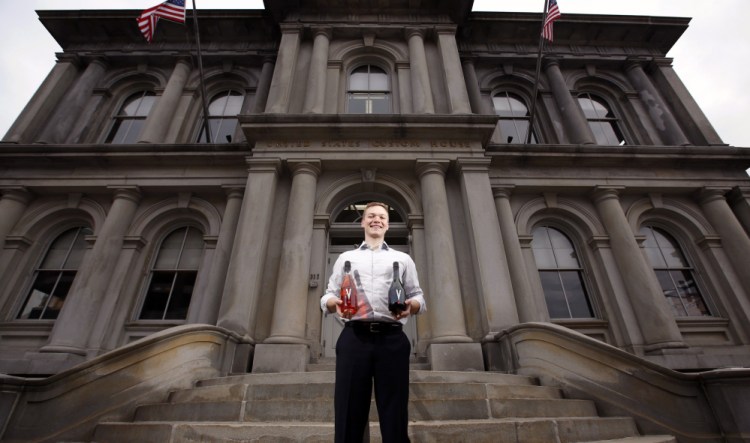In the Champagne region of France, about 100 miles east of Paris, there are 14 acres in the Côtes de Sézanne where the family vineyards of Cédric Guyot have been producing grapes and making Champagne for three generations. One day, a fresh-faced college kid from America came knocking at the door, in the small village of Fontaine-Deni.
That kid, Thomas Brems, struck a deal with Cédric Guyot, and now, just a few years later, two of the small grower’s Champagnes are being sold in 13 locations in southern Maine and nowhere else in the United States: Brut Millésime 2009, a traditional vintage Champagne, and a Rosé Brut.
The first bottles hit the shelves in September, costing about $55 per bottle. Brems’ goal is to eventually reach out beyond Maine, and add more small, craft Champagne producers to his fledgling label – Victorieux – who do not yet import their product to the United States. Each bottle of Victorieux will tell the story of the grower on the back.
Brems, now 24, realizes he is a tiny grape in a very large vineyard. He is competing not only against the large industrial Champagne producers but also the blossoming small grower movement seeking to capture the market of Champagne drinkers who want charming stories and plenty of terroir with their bubbles.
“The difference with mine is I keep overhead as low as possible,” Brems said. “It’s just me. It’s very bare bones as it stands now. My belief and philosophy is, if you bring in a high-quality product for a fair price then you can’t fail, as long as you’re marketing adequately and somewhat getting the name out there, doing tastings and things like that, raising a little bit awareness. That’s my strategy. It’s not to overtake (the larger labels). It’s just to fill the niche for people who want a little bit higher quality but not break the bank.”
Brems was born in Arizona. When he was 15 years old, he went to high school for a semester in France, attending a public school in Troyes. His mother and step-father bought a home in the Champagne countryside town of Aix-en-Othe, and opened a tiny restaurant there, giving Brems more opportunities to visit the area.
“We started seeing a lot of little producers that have a sign on the side of the road on the Champagne trail,” Brems said. “That’s how they sell most of their product, just right out of the cellar. It’s cheap, and it’s really good stuff.”
When he reached college and started thinking about “what I could do with the cards I was dealt in life,” Brems began learning more about Champagne. And he decided to go to law school. He still wasn’t entirely sure what his path would be, but he knew that a law degree would help him should he decide to build some kind of Champagne business.
He ultimately decided on the University of Maine School of Law, where he started taking classes in 2014. He had never visited Maine before, but he liked the fact that Maine Law was a smaller, less competitive school filled with older students who had more real-world experience.
“My intention at first was to transfer after about a year, but I ended up coming ,and I just loved it here. I decided to stay, and decided to work on my business here and keep it in Portland.”
In 2015 and 2016, Brems received entrepreneurial fellowships from the Bride Family Foundation, funded by a graduate of the law school, and he used the opportunity to start developing Victorieux. He networked with retailers, importers and distributors, and figured out he needed both a federal and a state permit. He got the French ‘Marque d’Acheteur’ required for businesses that buy finished wine and sell it under their own private label.
And he started looking for small, off the beaten path growers who may have once sold to large houses like Moët and Veuve Clicquot but have shifted closer to their roots, just as craft brewers did in the United States and started a little revolution focusing more on story and place. Brems remembers when he first met Cédric Guyot, his overalls covered in mud, and his little son – the next generation of Champagne producer – running around behind him.
“I just fell in love with the charm of the place,” Brems said.
Now Brems is working with a wine consultant in France, on the hunt for more small growers to add to his label. He just started working at Opticliff Law in Portland, which specializes in start-ups and business and trademark law. And his first bottles of French Champagne are in Whole Foods Market, Browne Trading Co., Old Port Wine Merchants and other southern Maine stores. Victorieux is also being served at a couple of small restaurants, and at the Inn at English Meadows in Kennebunk.
It is, as Brems says on his website, “the way wine should be.”
Correction: This story was updated at 10:57 a.m. on Dec. 13, 2017 to correct that Brems attended the University of Maine School of Law.
Send questions/comments to the editors.




Comments are no longer available on this story